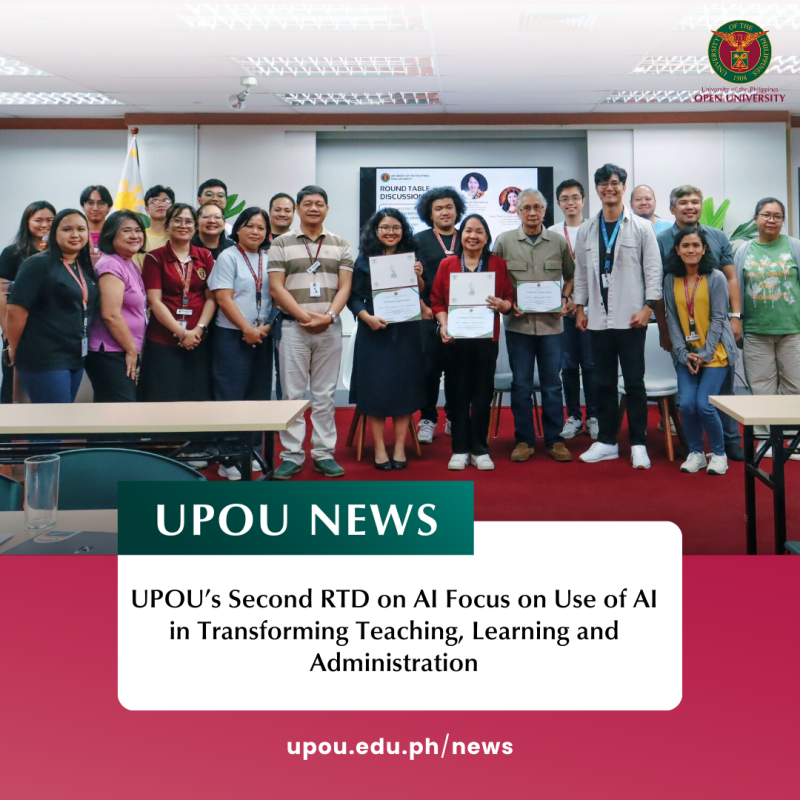The University of the Philippines Open University (UPOU) held the second installment of its Roundtable Discussion (RTD) on Artificial Intelligence (AI) spearheaded by the Information and Communication Technology Development Office (ICTDO) with the Center for Open and Digital Teaching and Learning (CODTL). The RTD was held on 8 July 2024 online and physically at the UPOU Audiovisual Room, UPOU Headquarters in Los Baños, Laguna.
The RTD, titled “AI and University-wide Experience: How AI is Transforming Teaching, Learning and Administration,” featured four resource speakers. After a warm welcome message from Dr. Reinald Pugoy, ICTDO Director, the program proceeded with the presentations. The first speaker was Dr. Melinda dela Peña Bandalaria, a UPOU Professor and Chancellor who shared her experience using AI in her courses and her simple study about how AI enhances learning outcomes. She presented how she incorporated ChatGPT in one of her courses and devised a way to make revisions in between to ensure that students still learn even while using AI tools. “At the end of the day, what is important for me is that learning took place,” she stated.
Mr. Lexter Mangubat, UPOU Instructor and Deputy Director for the Educational Media Production Unit of the Center for Open and Digital Teaching and Learning (CODTL), then shared the various AI tools he uses to perform his tasks as an administrator and as a faculty-in-charge. He shared that ChatGPT, Grammarly Go, Perplexity, ElevenLabs, Slider, and Canva Magic Media are tools and applications that help him draft letters and email responses, enhance scripts for OERs, and produce voice-over narrations. In addition, as a faculty-in-charge, AI tools help him generate assessment instruments, create training materials and presentations, produce images/badges, and as a research assistant. He also shared several challenges he encountered in AI in classes he handled and stated that natural intelligence is necessary to effectively and efficiently use AI, and going back to the basics and teaching AI literacy is essential.
Thirdly, Asst. Prof. Lorena Jean Saludadez, a faculty member of FMDS, shared her recollection, reflections, and insights on her students’ use of AI. She felt betrayed upon learning that her students use AI tools for their courses, but upon inquiring deeper, she realized that students use AI for several reasons, not just for dishonest gains. She also shared that it reflects how teaching can be improved and how AI can be integrated and maximized more into the teaching and learning process.
Lastly, Dr. Alexander Flor, UPOU Professor Emeritus and Former Dean of the Faculty of Information and Communication Studies, presented his take on using AI in education through anticipatory science. He shared his experience using ChatGPT with his undergraduate students and tutors and shared the dark side of AI among learners and teachers. Dr. Flor also gave an overview of a recent study he is conducting with several faculty members of FICS who are experts in quantum computing, AI, and immersive learning. The study is titled “Interrogating Higher-Order Impacts of Disruptive Technologies on Quality Education (SDG 4): A UP Community-Wide Anticipatory Study in Complexity.” He shared that the results of the study will be published in a Monograph and several journal articles.
After the presentations, a discussion took place where participants shared their reflections and insights. There were also suggestions to concretize the policy and practice of AI at UPOU. The participants also discussed the future direction of AI at UPOU, suggested ways to implement AI in teaching and learning, and brainstormed how to document and share their knowledge and practice of using AI for education. Dr. Shari Eunice San Pablo was the host and moderator for this engaging session.
Written by Anna Cañas-Llamas ♦ Edited by Dr. Myra C. Almodiel ♦ Photo by Zyrene Villanueva









